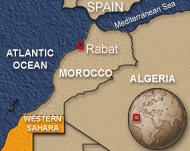Uruguay recognises Western Sahara
Uruguay says it has recognised the Sahrawi Arab Democratic Republic, proclaimed by the Polisario Front in Moroccan-ruled Western Sahara, triggering an angry response from Rabat.

The Moroccan Foreign Ministry said: “By this hostile and unfriendly act … Uruguay assumes the heavy responsibility of striking a fatal blow against the close relations between the two countries.
“This decision constitutes an affront to the unanimous sentiments of the [Moroccan] people.”
The Uruguayan Foreign Ministry’s website said the Latin American country had established diplomatic relations with the “sole Spanish-speaking Arab nation”, referring to Western Sahara’s former status as a Spanish colony.
Montevideo said the move demonstrated its commitment to “self-determination, non-interference by other nations in domestic affairs and national sovereignty”.
But the Moroccan Foreign Ministry said Uruguay’s arguments were “feeble” and “incoherent”, and showed “profound ignorance of the actual and historical realities of the region”.
Polisario praise
The Polisario Front, which fought a lengthy guerrilla war against Moroccan forces before a ceasefire in 1991, embraced Montevideo’s announcement as “a victory for the Sahrawi people in their fight for self-determination”.
Moamed Khedad, a Polisario spokesman, said: “This recognition shows the pressing problem of the Western Sahara and the growing isolation of Morocco on the international scene.”
 |
|
Western Sahara’s post-colonial |
He said Uruguay had joined about 70 countries, mostly Asian and African but also “at least 20 in Latin America”, which recognised the republic.
The 266,000 square kilometres (90,000 square miles) of phosphate-rich desert flatlands on Africa’s northwestern coast is the only territory on the continent whose post-colonial legal status has not been resolved.
Western Sahara was annexed by Morocco in 1975 after Spain gave up its rule.
Rabat has dismissed the last United Nations attempt to settle the dispute – a proposal for a five-year period of autonomy followed by a self-determination referendum.
The so-called Baker Plan was named after James Baker, the former US secretary of state, who threw in the towel in June 2004, expressing his frustration over lack of progress.
Recent months have seen clashes between pro-independence protesters and police in the main Western Saharan town of Laayoune.